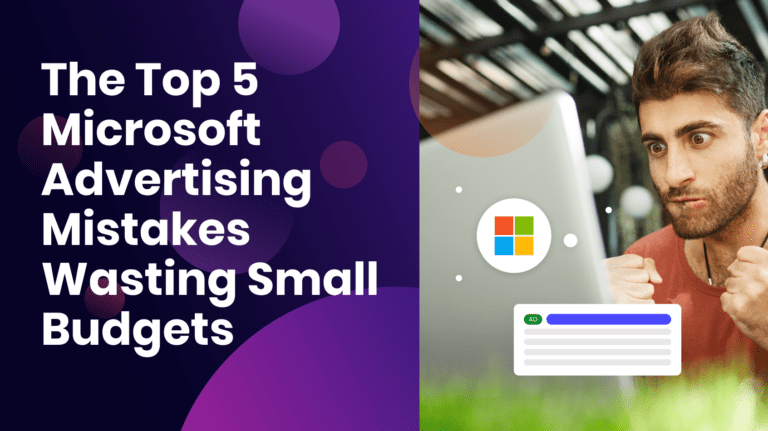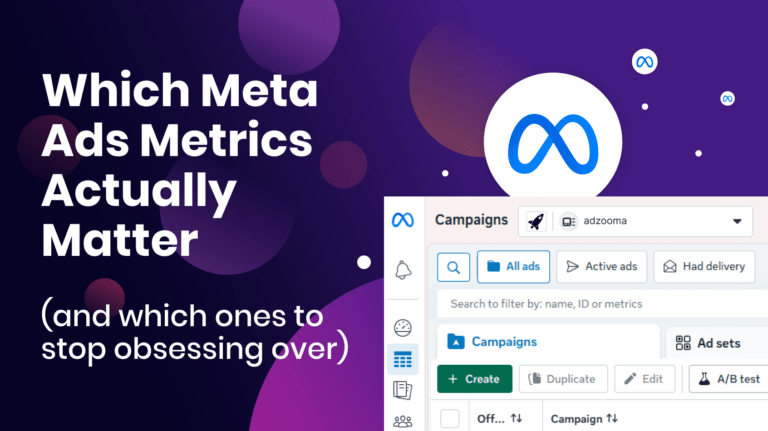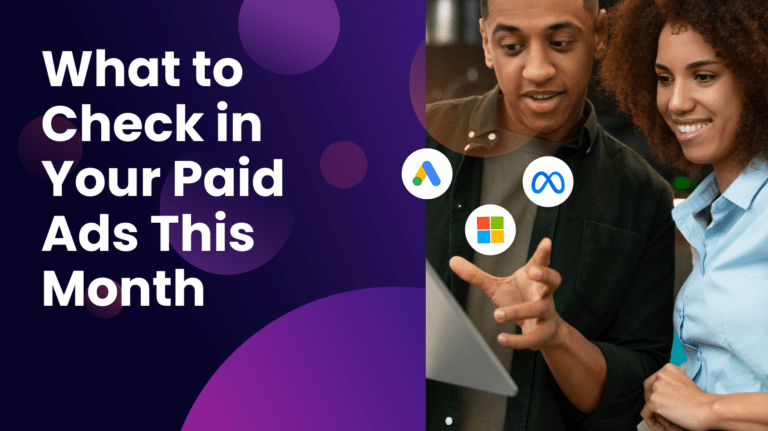We’re sure you know how useful Google Ads is.
It’s a fantastic way of targeting your customers online, bringing people to your website and increasing sales.
But let’s be honest here.
Google Ads can be difficult and confusing to use. It takes a lot of time and effort to get it right.
Even then, you could be making a few simple mistakes that damage your impressions, lower your clicks and cost you money.
Ready to change that? Here are the most common Google Ads mistakes you could be making…
1. Not Showcasing Physical Products In Shopping Ads
Google Ads aren’t limited to a simple text ad on their search results. They actually provide options to show your ads in a variety of formats across their search and display networks.
One ad format that’s underused? Shopping ads.
If you’ve got a physical product, shopping ads are a brilliant way to grab attention.
That’s because they include two things that normal text ads don’t:
- An image
- A price
Let’s face it, this is the information that your customers want to know. They want to see exactly what the product looks like and how much it will cost.
Shopping ads do this for you.
What’s better, these adverts don’t just get prime real estate on the search results page, they also appear on the Google shopping results and on search partner websites, such as YouTube.
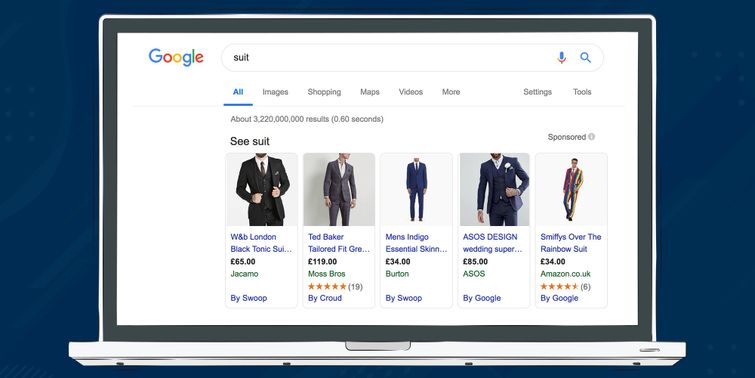
2. Not Using Keyword Match Types
Keywords are your Google Ads bread and butter.
And yet, so many people don’t correctly use keyword match types or fully understand what they do.
We’re going to change that. First of all, there are 4 primary keyword match types. These are:
- Broad Match
This is your Google Ads default that tries to get your advert in front of as many audiences as possible. So it will show up on misspelt searches, synonyms and similar variations.
Although this is a great thing for expanding your reach, you might find you end up wasting your budget on searches that don’t really matter.
Let’s say you’re a music teacher bidding on the keyword ‘Piano Lessons’.
You won’t just show up for ‘Piano Lessons’, but also on searches like ‘Piano Tutor’, ‘Piano For Sale’ and ‘Piano Tuning’. Some of which are completely unrelated to your business and would be a waste of your budget.
2. Broad Match Modified
This is similar to Broad Match but gives you an extra level of control by narrowing down the searches to the exact words, or close variants on them, in any order.
So, with the ‘+Piano +Lessons’ keyword, you could appear for searches like ‘Lessons for Piano’.
3. Phrase Match
This keyword match type means that someone has to search for the phrase, either on its own or inside another search term.
So, if you had “Piano lessons” as a phrase match keyword, you might come up in searches like: ‘Cheap Piano Lessons’ or ‘Piano Lessons for 8-Year-Olds’.
4. Exact Match
This is the most restrictive type of keyword match type and will only appear when a user searches for the exact phrase you’ve highlighted. It’s used when you know exactly what search result you want to appear in.
If you had the exact match on [Piano Lessons] you’ll only appear in searches for Piano Lessons.
Mangools have a great Keyword Research tool which allows you to find keywords that you can easily rank for, see where your competitors rank and get search volumes with historical data. Check out their 10 day free trial here.
Want more information? Read about keyword match types here.
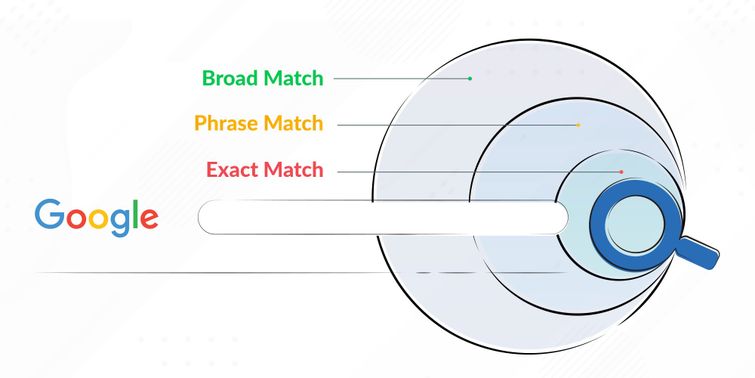
3. Not Using Negative Keywords
Negative keywords are a way of preventing your ad from appearing in certain searches that don’t do any real favours for your business.
They stop you wasting your budget on people who will never become customers and ensure your adverts are targeted to the people that really matter.
Going back to the ‘Piano Lessons’ example, let’s say your advert was appearing in the following searches:
- Online Piano Lessons
- Self-Taught Piano Lessons
- Piano Lessons Video Tutorial
None of these searches are going to be made by people who are looking for a tutor. Which means you’re throwing money away by appearing in these searches.
However, if you add ‘–self-taught’ ‘–online’ and ‘–video’ as negative keywords, your advert will never show up in these searches and you can stop throwing money down the drain on clicks from the wrong audience.
4. Not Using A Targeted Landing Page
The sale isn’t made when someone clicks on your advert. In truth, that’s only half the battle.
From there, you have to convince them to actually buy your product or get in touch with your company. Your landing page is how you do this.
But, unfortunately, a lot of businesses don’t use targeted landing pages that work for them.
Going back to the piano lesson example, a targeted landing page for them should:
- Provide the necessary information, detailing where the lessons take place, how long they last and how much they cost.
- Explain the benefits, telling visitors that the lessons will help them master the piano and become the centre of attention for their skills.
- Build trust, showing that the tutors are trained, certified and friendly.
- Set them apart from the competition, explaining that their lessons are cheaper than a competitor’s.
- Convince them to take action, encouraging them to book their first lesson.
But most of all, it needs to be targeted to your advert. If users click on an advert about piano lessons, they need to be taken to a page about piano lessons.
Don’t take them to a generic page about all the music lessons you offer or where they’ll find a piano for sale. They won’t stick around to find the information they’re after.
5. Not Using Ad Groups
Ad groups are a way of organising your ads around a single, common theme.
This means you can create more focused adverts that don’t try and promote everything in one go. Instead, they’ll focus on one product, demographic or event, giving you laser focused adverts designed to improve your success.
Want to get the best use form your ad groups? Read our guide here.
6. Not Using Ad Extensions
Ad extensions are a way to pack extra information into your text ads, giving you a bigger impact.
Why? Because they’re big. They’re noticeable. And they’re clickable – so your customers can take direct and immediate action.
Best of all, they don’t cost you anything extra – so you can enjoy a better ROI.
Ad extensions don’t just draw attention to your ad, they’re also a great way of helping you achieve your campaign goals.
- Want to get people browsing your website? Add a site link extension.
- Want to encourage calls? Add a mobile extension.
- Want to get people to your store? Add a location extension.
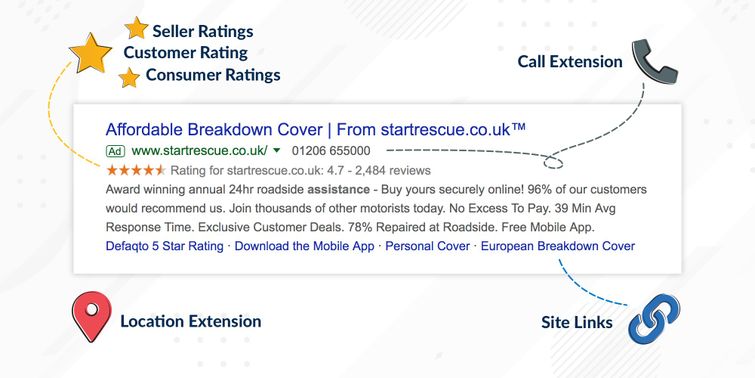
Boost your Google Ads success
Google Ads is filled with tools designed to help you build ultra-targeted and laser-focused campaigns that will achieve results.
The biggest mistake you can make is not using them to your advantage.
Need an extra hand with your Google Ads?
Luckily, we’ve got just the solution for you. Our platform analyses your Google Ads account and automatically finds and highlights any mistakes you might be making. It then uses this to provide personalised opportunities to increase your success and boost your profits. All, while saving you time and effort.

